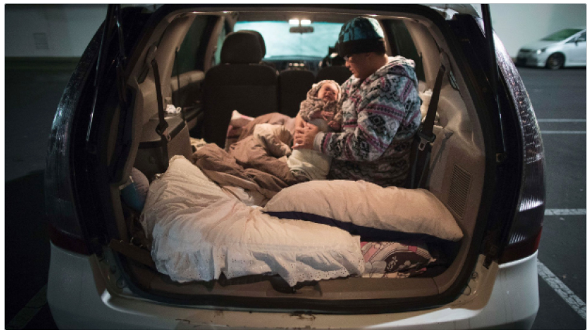CommentsPLANNING WATCH - Wall Street works through advocacy organizations, public officials, and blinkered housing and planning specialists, to fine tune its schemes for extracting even more rent and mortgage payments from the working and middle classes.
Big surprise that these WIMBY (Wall Street in My Backyard) schemes make the housing crisis worse. In response to these failed housing policies, LA’s City Council banned “camping on public property.” This new law allowed the Los Angeles Police Department (LAPD) to force homeless encampments to pick up and relocate. This anti-camping ruse is the same one that former LA Mayor Villaraigosa resorted to in 2012, when he ordered the LAPD to crush LA’s Occupy Movement because they were camping in a "city park", City Hall’s quickly renamed lawns.
This is how the Los Angeles Times recently described this "new" homeless policy:
“Homeless policy shifts to removal of encampments. LA Council members have proposed nearly 300 sites for a camping ban. But insufficient housing is still an issue. The city of Los Angeles has undertaken a major shift in its approach to homelessness, one that puts a priority on clearing unsightly street encampments even when insufficient permanent housing exists for the people being moved.”
This Los Angeles City Council-adopted anti-camping ordinance reveals the real-world consequences of first privatizing Federally-funded low-income HUD public housing and then devolving (transferring) this unfunded responsibility to states and cities. The locals, in turn, turned to private developers to build and manage low-income apartments. To persuade developers to take on these tasks, local officials offered them two carrots: up-zoning and density bonuses. A decade later, we now know that this approach has been a total failure. Homelessness, overcrowding, and the price of housing are still increasing.
Faced with their constituents’ mounting outrage at the homeless encampments resulting from their dangling carrots, local officials opted again for anti-camping laws. As for the underlying causes of homelessness, they got worse since the carrots increased the cost of housing and displaced low income tenants to make way for new luxury high-rise apartment buildings.
By turning even more to the LAPD to deal with homelessness, City Hall’s decision makers have conceded that their up-zoning and density bonus housing programs have been total flops. They made developers richer at the expense of maxed-out renters and homeowners, 41,000 of whom ended up sleeping on sidewalks or living in their cars.

Mother and newborn forced to live in a car.
Snow jobs to con the public. Knowing how concerned the public was about homelessness, elected officials and developer-funded advocacy groups made endless claims that up-zoning would solve the housing crisis. For example, they repeatedly stated that homelessness resulted from a housing shortage, even though the City of Los Angeles has approved 167,000 new homes since 2015, while 600,000 Angelenos are still unable to find low-priced housing and LA’s population dropped by 100,000 people.
Despite these failed policies and feeble justifications, we should expect renewed efforts, such as the 2021-2019 Housing Element, to pawn off the same trickle-down housing programs as the City’s best approach to end the housing crisis.
In fact, we have seen this before. In the wake of the 2011-12 Occupy Movement, City Hall noticed more public concern about economic inequality, so quickly reframed its trickle-down housing policies. They reduced economic and racial inequality, countered historic red-lining, and increased neighborhood integration. In fact, economic and racial inequality is still increasing, and the deepening housing crisis is one of the causes.
Another claim to justify up-zoning, that it promotes transit use and therefore reduces the Green House Gas emissions responsible for climate change, is also wrong. Up-zoning increases property values, and this results in luxury apartment buildings with exorbitant rents. Only high-income tenants can afford their rents, and nearly all of these tenants own and drive cars. This leads to more, not less, traffic congestion and Green House Gas emissions.
But there is more to this story because Wall Street is heavily investing in urban real estate, especially apartments and homes, to crank-up its rate of return. For example, until recently the real estate company, Zillow, was buying 5,000 houses per month for short-term flipping. But Zillow could not find enough craftsmen to fix up these houses, so it placed its home-buying business on pause and then decided to unload its inventory at a loss.
But this did not mean that the WIMBY’s were moving out of your backyard. Other real estate titans were eager to buy Zillow’s inventory of unsold homes. They weren’t corporate flippers, but like American Homes, corporate landlords who realized that families who lost their homes would be forced to rent. These rental companies made a profitable calculation that Wall Street should stay in the backyard of the increasing percentage of renters. This development debunked the latest claim to justify up-zoning and density bonuses, that they increase the intergeneration of transfer of wealth. While true for those at the top, the rest of the population has not been lifted by this rising tide of increasing home values.
Conclusion? The next time you see the LAPD rousting a homeless encampment, just remember that the WIMBY’s are still in your backyard, concocting more whoppers to convince their victims that giveaways to developers will eventually trickle down to them.
(Dick Platkin is a former Los Angeles city planner who reports on local planning issues for CityWatchLA. He serves on the board of United Neighborhoods for Los Angeles (UN4LA) and co-chairs the new Greater Fairfax Residents Association. Previous Planning Watch columns are available at the CityWatchLA archives. Please send questions and corrections to [email protected] ).
















